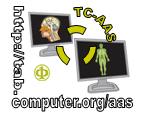Third IEEE International Conference on Self-Adaptive and Self-Organizing Systems
Location: San Francisco, California, September 14-18, 2009
Workshops
Workshop on Self-Adaptation for Robustness and Cooperation in Holonic Multi-agent systems (SARC) Cancelled
Date: September 14th
Organization:
- Emmanuel Adam, LAMIH - UMR CNRS 8530, Universite de Valenciennes et du Hainaut-Cambresis - FRANCE
- Vincent Hilaire, SET - UTBM Belfort, France
- Paulo Leitao, Department of Electrical Engineering Polytechnic Institute of Braganca, Portugal
- Paul Valckenaers, Division of Production Engineering, Machine Design and Automation (PMA) KUL, Leuven, Belgium
Abstract: Holonic Multi-Agent Systems, mainly used and developed in manufacturing systems, are more and more used in other fields such as complex system simulations, information systems, cooperative work...
Holonic Multi-Agent Systems are flexible; the only strict obligation is to follow a pyramidal structure. They really have an interesting potential, however, methods and tools to facilitate their design and management, in particular regarding to their Self-Adaptation and Self-Organization properties, are required.
Indeed, the main characteristics of an Holonic Multi-Agent System, that are the robustness and the cooperation, are dependent of the dynamic of the multi-agent system.
Robustness enables Multi-Agent Systems to cope with perturbations, faults and hard constraints. Implementing such a property is typically a self-organization problem where regeneration of faulty agents, generation of new agents and/or migration of agents between Holonic Multi-Agent Systems are some examples of the proposed answers.
Cooperation means that even if each agent has classically its own goals and strategies in the pyramidal organization, all agents taken together have to collectively lead the Holonic Multi-Agent System to its intended global goal. This property is generally processed by letting the agents locally and autonomously modifying their roles or behaviors, by adapting their strategies to work with other agents; it is a self-adaptation property.
Emergence of behaviors, roles or organization is a reality and a need in Holonic Multi-Agent Systems and has to be analyzed and controlled.
Second International Workshop on Self-Adaptation for Robustness and Cooperation proposes a framework to discuss on models and methods linked to robustness and cooperation in holonic multi-agent systems, and multi-agent systems, enabling emergence of new behaviors and sub-organizations.
The workshop also aims to establish links between searchers that come from the Information Technologies field and searchers working in the holonic manufacturing systems domain.
Workshop on Business Applications and Potential of self-adaptive and self-organizing systems (SASO-Biz) Cancelled
Date: September 14th
Organization:
- Mazin Yousif, (Avirtec Corporation, USA)
Abstract: The aim of this industry-oriented workshop is to gather people from industry to exchange information about current and future business applications of self-managing, self-adaptive and self-organizing systems, and to strive to anticipate the implications of their large-scale use for industry (providers and customers). How can we turn a technological potential into a mass-market reality? There will be no proceedings and no papers, just presentations and hopefully fruitful discussions. All speakers and panelists are invited by the Workshop Chair.
Workshop on Spatial Computing (SCW)
Date: September 14th
Organization:
- Dr. Jacob Beal (BBN Technologies)
- Dr. William Butera (Mitsubishi Electric Research Laboratories)
- Dr. Marco Mamei (Universita di Modena e Reggio Emilia)
- Prof. Olivier Michel (Univ. Paris 12)
Abstract: Many self-organizing or self-adaptive systems are "spatail computers" - collections of local computational devices distributed through a physical space, in which:
- the difficulty of moving information between any two devices is strongly dependent on the distance between them, and
- the "functional goals" of the system are generally defined in terms of the system's spatial structure.
Similarly, in reconfigurable microchip platforms, moving data between adjacent logic blocks is much faster than moving it across the chip, which in turn favors problems with spatial structure like stream processing. In biological embryos, each developing cell's behavior is controlled only by its local chemical and physical environment, but the eventual structure of the organism is a global property of the cellular arrangement. Moreover, a variety of successful established techniques for self-organization and self-adaptation arise from explicitly spatial metaphors, e.g., self-healing gradients.
On the other hand, not all spatially distributed systems are spatial computers. The Internet and peer-to-peer overlay networks may not in general best be considered as spatial computers, both because their communication graphs have little relation to the Euclidean geometry in which the participating devices are embedded, and because most applications for them are explicitly defined independent of network structure. Spatial computers, in contrast, tend to have more structure, with specific constraints and capabilities that can be used in the design and analysis of algorithms.
The goal of this workshop is to explicitly identify the idea of "spatail computing" as a theme in self-organizing and self-adaptive systems, and further to develop the study of spatial computation as a subject in its own right. We believe that progress towards identifying common principles, techniques, and research directions - and consolidating the substantial progress that is already being made - will benefit all of the fields in which spatial computing takes place. And, as the impact of spatial computing is recognized in many areas, we hope to set up frameworks to ensure portability and cross-fertilization between solutions in the various domains.
Workshop on the Practice and Theory of Programming Collectives (PROTOCOL) Cancelled
Date: September 15th
Organization:
- Martijn Schut, VU University Amsterdam, The Netherlands
- Nivea Ferreira, Radboud University Nijmegen, The Netherlands
- Virginia Dignum, Utrecht University, The Netherlands
Abstract: Established and upcoming research areas such as multi-agent systems, nature-inspired/evolutionary computation, pervasive/autonomic computing and collective intelligence all share one single important property: the involvement of a collective of individuals (agents, solutions, humans, insects, CPUs) that has to accomplish a goal or objective. The types of collective systems commonly used in the mentioned areas can be considered in the range from (on the one extreme) closed and centralised computer clusters at a single location, to (on the other extreme) open and distributed human-computer networks located world-wide. The issue of programming these systems is central to this workshop, as well as closely related facets like requirement specification, design (patterns), formal models, simulation and implementation. Regarding these issues, the workshop attempts to fill a growing gap that exists between researchers working at different points on the above-mentioned system range, as well as on the theoretical (formal, logics, representation) and practical (simulation, fieldwork, algorithms) aspects of programming collectives. We also aspire to create a forum of discussion among people with different backgrounds on system development in order to stimulate synergy between areas and disciplines. Such a forum is, so far, non-existent. Regarding the general topic of self-adaptive and self-organising systems, the issue of designing and engineering these types of systems has long been considered an extremely important theme deserving much attention. Whereas it has been recognised that theoretical and practical approaches to system design need to be combined (because of the inherent complex nature of SASO systems), there is not yet a forum that has the explicit aim to bring theory and practice closer together - we propose to fill this gap.
Workshop on Architectures and languages for self-managing distributed systems (Self-Man)
Date: September 15th
Organization:
- Jean-Bernard Stefani, INRIA, Grenoble, France
- Seif Haridi, SICS & KTH, Stockholm, Sweden
- Peter Van Roy, Universite Catholique de Louvain, Belgium
Abstract: The goal of the workshop is to bring together researchers and practitioners interested in the construction of self-managing distributed systems. It will place the emphasis on software engineering (especially, software architecture and component-based software engineering) aspects of this construction, including models, architectures, languages, control techniques, middleware and tools that can be used to support the modular and principled building of self-* distributed systems. Topics of interest for the workshop include (but are not limited to):
- Component models and architectures for self-management.
- Generative and reflective (including aspect-oriented) techniqu>es for self-management.
- Languages for self-managing systems, including formal specification, architecture description, programming, and domain specific languages.
- Control techniques for self-managing systems, including control-theoretic and decision-theoretic techniques.
- Coordination and decentralized architectures of control.
- Analysis and verification techniques for self-managing systems.
- Middleware and tool support for self-managing distributed systems.
- Algorithms for distributed self-management, including event detection, distributed control, etc.
Workshop on Metareasoning in Self-Adaptive Systems (Metareasoning)
Date: September 15th
Organization:
- Robert Laddaga, Senior Research Scientist, Intelligent Computing, BBN Technologies.
- Anita Raja, Assistant Professor, Department of Software & Information Systems, University of North Carolina at Charlotte.
- Michael L. Anderson, Assistant Professor. Franklin & Marshall College.
- Howard Shrobe, Principal Research Scientist, MIT.
- Shlomo Zilberstein, Professor, University of Massachusetts.
Abstract: The 21st century is experiencing a renewed interest in an old idea within artificial intelligence that goes to the heart of what it means to be both human and intelligent. This idea is that much can be gained by thinking of one's own thinking. Metareasoning is the process of reasoning about reasoning itself. As shown below, it is composed of both meta-level control of computational activities and the introspective monitoring of reasoning to evaluate and to explain computation. Meta-level control is the ability of an agent to efficiently trade off its resources between object level actions (computations) and ground level actions to maximize the quality of its decisions. Introspective monitoring is necessary to gather sufficient information with which to make effective meta-level control decisions or to explain failed object-level reasoning. This workshop will explore the implications of this model by examining the various aspects of metareasoning and models of self and their role in single-agent and multiagent applications.
This one-day workshop will focus on techniques and benefits of metareasoning and introspection in self adaptive systems. It will include a number of short paper presentations, thematically organized discussion sessions, and a keynote speaker. We also will include panel discussions so that the audience can ask follow up questions that compare and contrast related positions.







